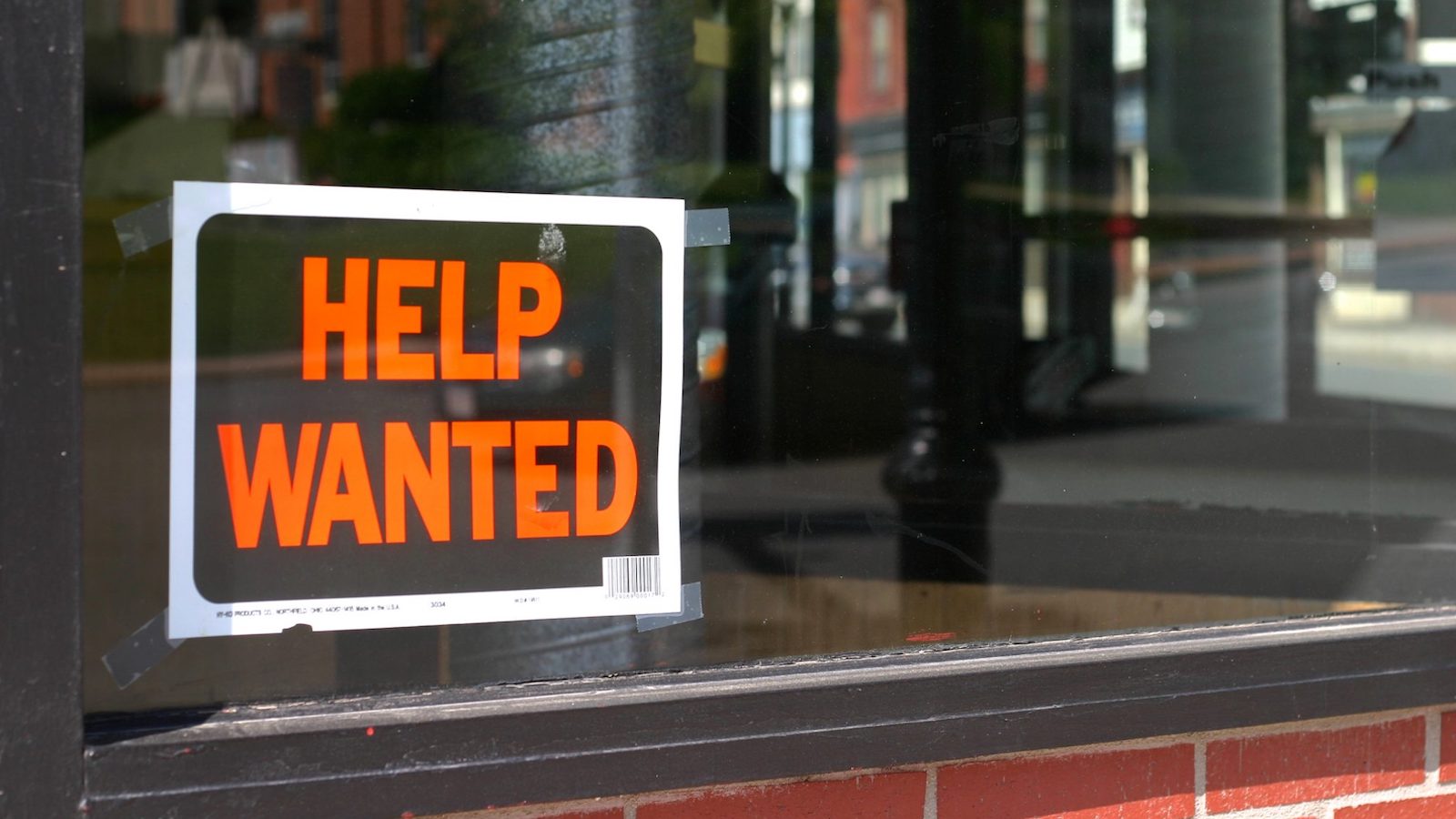
Employers are Struggling and Lefties Couldn’t Be Happier
You know something’s wrong when the smart people wave their hands and say, “nothing to see here!”
If you’ve ventured out of your domicile lately to partake in one of those ancient pastimes we once referred to as “restaurants,” you may have encountered some unexpected signage. Homemade signs—usually just a piece of 8×10 white paper with a piece of Scotch tape—have been spotted at eateries bearing both an apology and an exhortation: sorry about the lack of staff, and also PLEASE APPLY NOW, HELP DESPERATELY NEEDED!!
The Washington Post reports: “A nationwide shortage of restaurant workers is emerging as one of the defining quirks of the nation’s economic recovery from the pandemic.” As the country slowly emerges from the throes of a gnarly respiratory virus, and alighting summer rays beat back the pathogen, restless recluses are starting to forgo Uber Eats in favor of the real thing: a sit-down dinner on a table-clothed four-top that isn’t a TV tray.
While all the fixings of the dining experience are back—ambient lighting, artificial tea candles, pepper mills, cloth napkins, recycled Heintz bottles filled with generic tomato paste—one ingredient is missing: people to cook, serve, and clean up after you. “The unemployment rate remains elevated at 6.1 percent, but even as dining establishments aggressively hire workers, data and anecdotal reports suggest they are having trouble luring anywhere near enough staff,” the Post continues.
A litany of local news outlets have been covering this paradoxical tight-loose labor market: with a pool of unemployed not seeking employment despite a ringing demand for workers. The national media, always lugging along under the yoke of its own biases, has just started drawing attention to the new hires need. Acela Corridor hacks can only ignore the long wait times for their bánh mì and watery highball for so long.
There are a whopping 8 million open jobs according to the Bureau of Labor Statistics. A record-high 44% of small businesses can’t fill vacant positions. Some proprietors are even hanging it all up, not even bothering to cast a line in search of elusive employees. Plus, an onslaught of government restrictions related to the pandemic still plague many small businesses in major cities, as recently documented in All We Have, the latest film from Free the People.
So what’s going on? Despite hardships in some major cities, most states are lifting capacity limits on private businesses. The CDC is “allowing” us to do what everyone, barring the most hypochondriac liberals, has been doing all along: not wear masks in low-transmission areas like the outdoors. The vaccinated, which includes almost a third of American adults, need no longer veil their airways indoors. The economy shouldn’t be humming along; the pistons should be going gadzooks. Every boîte, osteria, brasserie, beanery, and Applebees should be packed to the gills, with waiters’ pockets bulging with Biden stimmy. Every bartender, from the waistcoated mixologist at The Pierre to the mendicant flogging marked-up Olde English bottles on the corner, should be making a killing in tips. Instead, Delta Air Lines is begging staff to come in and tidy up its lounges off the clock.
President Biden should be presiding over an economic boom that would make the post-WWII spending spree look like the occasional night out. Yet the April jobs report whiffed on an estimated 1 million new payroll entries, recording just a quarter of that amount. President Normalcy and his loyal lackeys are happy enough shrugging the whole thing off, chalking up the underperformance to school closings.
Blaming the ongoing shuttering of schools, while partially valid, is beside the mark on the real motivator at work: extended and enlarged unemployment benefits. The gargantuan COVID-relief bill Biden signed last winter included a provision that topped up normal benefits by $300 a week. That extra three hundo makes unemployment more lucrative than minimum wage work in some states. And even if the bonus benefits aren’t leap-frogging the base legal pay, there’s an economic premium for doing nothing for something, as opposed to something for something. The iron law of economics is not annealed: if you pay someone to sit on their couch crunching pork rinds, well, by jingo, they’ll crunch scratchings to the bottom of the bag. Why work when you can laze around on the bum?
This freeloading should, in a bootstrapping society, be cause for alarm.
It was FDR, after all, who said “continued dependence upon relief induces a spiritual disintegration fundamentally destructive to the national fiber.” A country of layabouts will eventually consume all of its means, like a testosterone-brimming high school sophomore fresh off football practice raiding the fridge.
But many journalists are nonplussed over the cropping-up of “now hiring” placards. Or, they’re dismissing the staffing crunch entirely. “I’m not an economist, and I’m open to the idea of inflation spiking or the UI bonus being an impediment to fast job growth, but neither story really checks out yet. Feel like we should all sit tight and give this very weird recovery a full summer,” implored MSNBC’s Chris Hayes. I’d love to see the bespectacled Hayes make that plea to a struggling restaurateur in NYC who hasn’t had a full dining room in a year. He’d be lucky to escape with his Warbly Parkers uncracked.
Some leftists aren’t even bothering to hide their disdain over the plight of employers. The problem, in their contemptuous view, isn’t the added federal unemployment benefit, but that mom and pop shops should be able to compete with Uncle Sam’s generous wallet. “If you can’t afford to pay your employees a living wage, you do not have a viable business model,” snapped former Labor Secretary Robert Reich.
Another MSNBC anchor, Stephanie Ruhle, asked, “Why is it that the unemployment benefits are too generous rather than the pay offered by employers too low?” Sharp question! Seriously, how is it that a tiny delicatessen that hires teens to wash dishes is not going toe to compensation toe with the largest employer on earth? Ruhle continued on her ignorance streak: “If margins are so thin, that you cannot increase pay without passing it through/losing customers [then] your biz model doesn’t work.” Admire the business acumen: if you can’t just absorb another four-to-five-figure hit to your bottom line like a memory foam pillow, then pack up shop immediately.
This kind of reasoning is neither callous nor thickheaded. It’s perfectly in line with a hatred of the market economy, and the inherent inequalities of price competition. Committed leftists would rather see a business that doesn’t pay a “living wage” coupled with health, dental, and vision insurance go into Chapter 7 than let it eke out a slim profit. American dreams are out; it’s MD wages for everyone or nothing!
The capitalist-carpers making this argument—whether they be accelerationists, red-eyed socialists, or unreconstructed Marxists—either never worked as teenagers, or, if they deigned to don a smock, were entitled brats the rest of us had to pick up the slack for when irate customers tired of waiting for their Big Macs. The concept of hard work—the moiling, grubbing, earning, learning, saving, accumulating, and cultivating of self-discipline—eludes them. That process is too slow; it’s way easier and less risky to tweet #fullcommunismnow and then pop another Hot Pocket into the microwave before retreating back down to mom’s basement. Or, as is disturbingly more common, kicking off your lecture before a Berkley poli-sci 101 class or anchoring the cable news morning slot.
In normal times, the low-wage job critique would be overruled by material practicality. A higher schooler might take an $8-an-hour job at Dairy Queen to save up for a PS5. But the pandemic, and the swamping of supplementary unemployment dollars on the idleforce, may do the tankie’s work for them. They were never going to punch in a timecard to do it anyway.
Free the People publishes opinion-based articles from contributing writers. The opinions and ideas expressed do not always reflect the opinions and ideas that Free the People endorses. We believe in free speech, and in providing a platform for open dialogue. Feel free to leave a comment.



